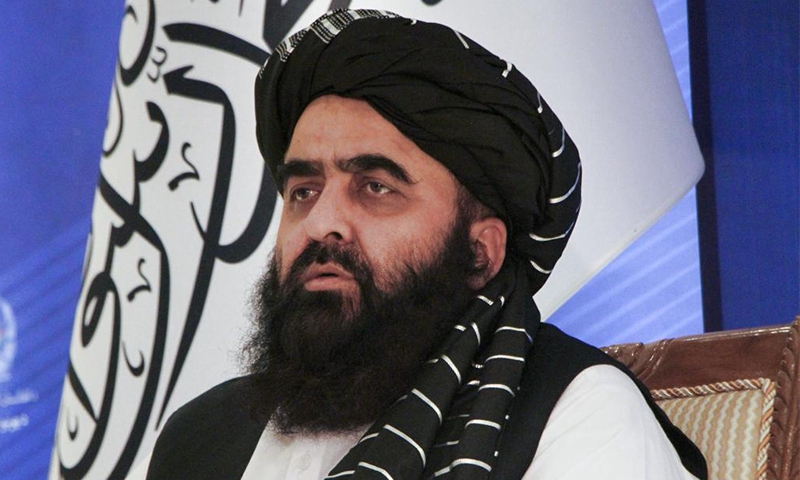
Acting Foreign Minister Amir Khan Muttaqi speaks during a press conference in Kabul, Afghanistan, Sept. 14, 2021.Photo: Xinhua
by Muhammad Ahmad Khan 11 April 2023
Acting Foreign Minister of the Taliban Amir Mutaqi said that there is no ISIS presence in Afghanistan and attacks like on Hekmatyar and in front of the Foreign Ministry are imported from outside. Whether the facts say the same, or the Taliban are just accusing the West, hiding their incapabilities and the presence of terrorist outfits in their country. In the Doha peace deal signed Afghan Taliban had pledged that they would use all their force to not allow any terrorist organization to raise its head in their country. But somehow, they have filed in curtailing it. ISIS in Afghanistan emerged in late 2015 in Afghanistan to expand the auras of their caliphate to Khorasan province. Hafiz Saeed Khan was given the lead to organize the group that pledged his adherence to Abu Bakar Al-Baghdadi. The US had been carrying out counter-terrorist operations against the organization that killed its leadership to much extent but still, the group remains alive and pose threat to not just the Taliban regime but also to other regional countries as the threat of their outward attacks remains on the screen.
From their inception, they have been recruiting members from not just Middle Eastern countries but also from Afghanistan, Iran, Pakistan, and also from Central Asian countries. They recruited children, brainwashed them, and trained them for their heinous adventures writes Nastasi and Desbois in “The Terrorist Factory: ISIS, the Yazidi Genocide and Exporting Terror”. However, besides the civilian recruitment, estranged members of other terrorist organizations like TTP and Lashkar e Islam also joined ISIS activities. Pakistan along with the US has been struggling to wipe out the organization’s presence from Pakistan but on the other side of the border in Afghanistan, it puts the responsibility on the government on that side. The U.S. Central Command’s General Michael Kurilla along with other top US military officials affirmed that ISIS has the will to act outside the Afghan borders. Pakistan has been repeatedly asking Afghan Taliban to raise their stakes against such terrorist outfits. Although they have taken some measures like a recent operation against the organization killing its six members, they must acknowledge the presence of the group, unlike Mutaqi’s statements. They have accepted that an operation was carried out in a hideout of ISIS in Mazar e Sharif, Balkh Province.
Anticipating the threats, regional countries must have a synergy in countering these emerging threats. There are stakes in each country. But obviously, one country cannot counter all problems, as globalization has promulgated to build trust among states so the issues of mutual concerns can be resolved with coalesced efforts. South Asian countries if does not urge Afghan Taliban to counter ISIS will have repercussions ranging from economic, social, and political to strategic as well. As Pakistan is already been managing refugees playing a brethren role towards its neighbour. India also had built huge investments in Ghani’s time and had wider influence strategically also. China has its own stakes as most of its economic corridors, the flagship projects pass through the Asian region. If it remains unable to protect these routes, no sense it makes to invest so extensively. Russia has been blaming the Taliban and Pakistan for supporting the Chechnyan rebels and has accused these fighters are being trained in Madrassas in Afghanistan. So, Russia has to play its part in spurring the Taliban to either cater to the ISIS problem solely or ask for international help. Because at this time, neither the international community nor Afghanistan itself can bear the losses from any terrorist activity.
The international community is already critical of the Taliban’s role and human rights violations. If any terrorist activity is being carried out by ISIS as US General is also anticipating, that again can indulge Afghanistan in a post-9/11-like situation. So, for the sake of the Afghan people, the major initiatives must be taken at the Taliban’s end. Firstly, it has to make establish a mutual political consensus against countering ISIS, Secondly, it has to build good relations with regional as well as extra-regional stakeholders like Pakistan, India, China, Russia, and European countries also. Starting from internal policy reforms, the group must ask the international community to recognize it and then initiate a joint operation against mitigating the ISIS threat. There are no genuine Islamic rather political reasons behind ISIS’s existence. Nastasi and Desbois have presented pieces of evidence of ISIS trainers drugging the children of 10 and eleven years so they can forget their identities and can fight for their cause. So, they are just besmirching Islam that requires an offensive from Muslims as well as non-Muslims for their national interest.
